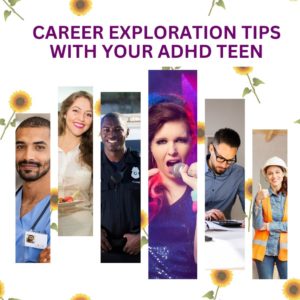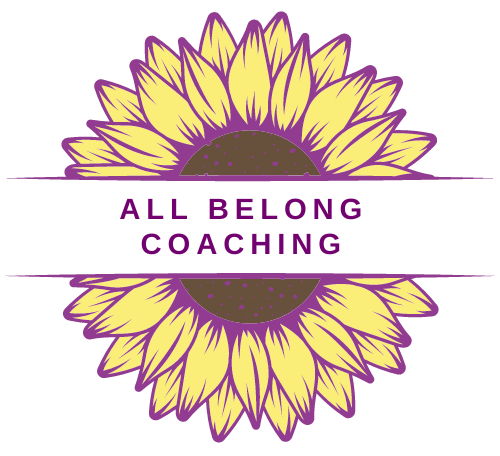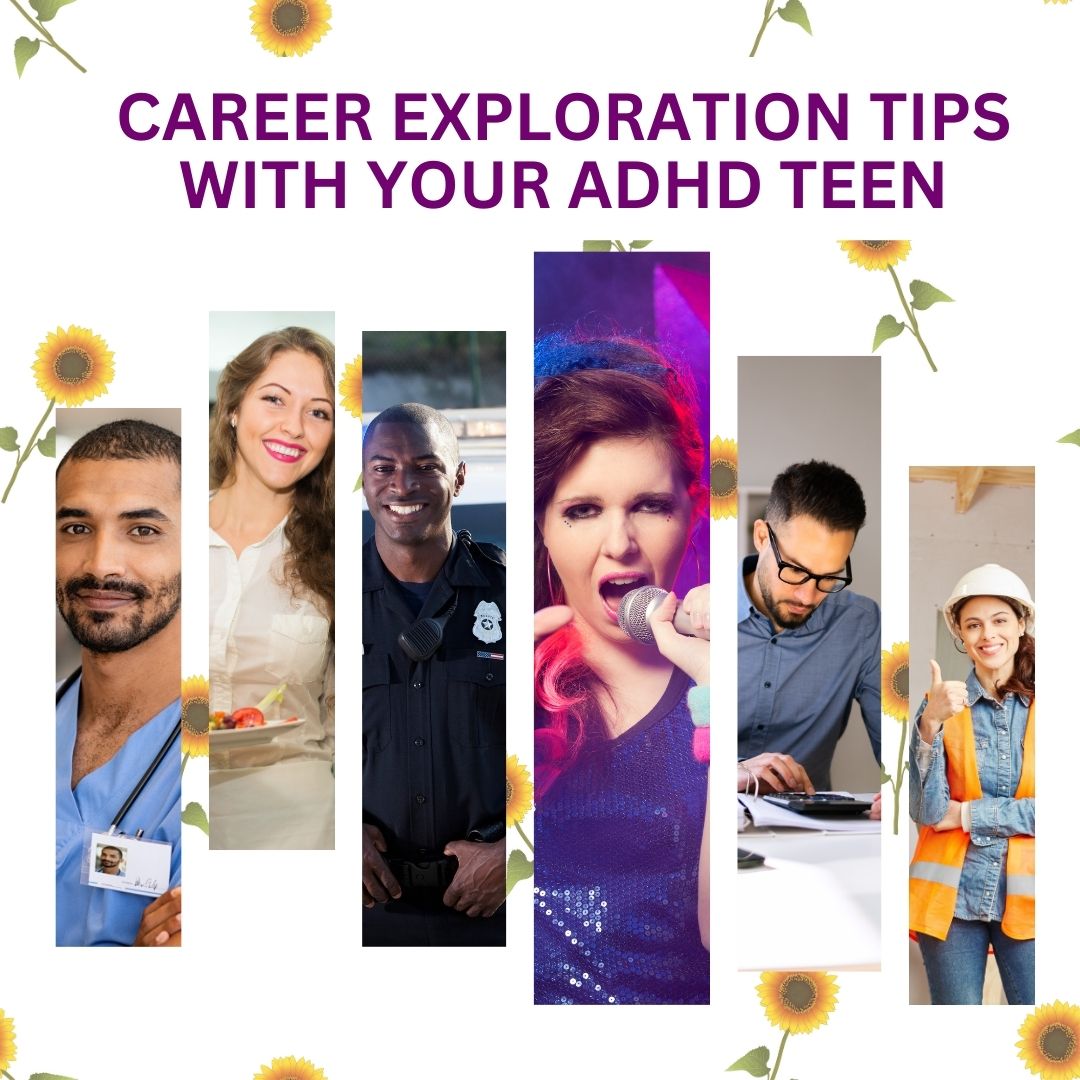Career Exploration Tips for your ADHD Teen
Last month we chatted about the differences in the ADHD brain that may contribute to your teen or young adult struggling with career exploration – or the dreaded “what I want to do when I grow up?” If you haven’t read it yet you can read that blog entry HERE.
We talked about challenges related to time management, time blindness, task initation and a bunc more. I promised to bring you some tips that might help if your teen or young adult is struggling with career exploration.
This is that blog! Before I get into more specific tips, the first thing I want to make sure you know, and you reassure your teen of – is that it’s OKAY if you don’t figure it out right away. Many folks with ADHD change careers either out of necessity or desire one or more times in their lives.
The process of deciding what to do next – after high school – after college – after aging out of foster care – after a setback – or even after a job or other type of loss – it can all be overwhelming, fun, anxiety-inducing, exciting – many big feelings and they are all okay.
My biggest piece of advice to you as a parent or caregiver is to find ways to reassure your young adult or teen that there are many options to explore, and time to explore them. Try to make career exploration fun!


Tips To Help With Figuring Out The Options
As our young adults near independence and start to figure out what their futures might look like – the student may become overwhelmed with choices.
Do I go to college? Do I go to trade school? Do I take a gap year? What do I want to be when I grown up? What college? What program? Do I just go out into the workforce? Do I even want to go to school? The Army?
On the other hand, they also may either feel as if they have no or limited options – OR they also may just feel like they don’t know or understand what the options are. Here are a couple of tips that might help.
- Meet Your Young Adult Where They Are – your student may be early in their discovery process or they may know a whole lot about what they want already. If they want to start at the very beginning of exploring, join them there. If they have a firm idea of what they want to do but maybe need help figuring out where and how, join them there.
- Identify The Good and The Bad – by this I mean – from your student’s point of view, what is the “good” – the things they are they looking forward to, think they are good at, are interested in, and what tools and resources they already have at their disposal. Also look from your student’s point of view what is “the bad” – what they are worried about, what they don’t want, what they think they might not be able to accomplish, what they think are there weaknesses. This will help you both form a path forward that works for them.
- Learn The Options – Depending on what stage of career exploration your student is in, make sure you both explore all the options. If they are deciding school, trade school, other training – make sure they know all of the options available. If they are deciding what career path – discuss as many options as possible. If they are looking to determine what school to attend or what program to take – make sure you look with them at as many options as you can research. Making decisions becomes easier when we know all the options.

Tips To Help With Time Management, Time Blindness, and Task Initiation.
As our young adults begin to make decisions, they may struggle with these executive function challenges. Here are some tips for helping with those!
- Time Lines – Set up time lines with your student IF there are time-bound restrictions. For example if your student has firmly decided to attend college, then you may need to break down tasks based on the deadlines for applications, etc.
- Visual Aids – Using things like calendars, planners, apps, phone alarms, etc. can help your young adult/teen to keep track of appointments and deadlines. Breaking down bigger projects down to smaller tasks with deadlines may also help.
- Incentivize – If your teen is struggling to get started on step – find a way to incentivize them. Can you make it fun? Can you give them seomething they’d enjoy if they complete it? Can you make it a game?

Tips To Help With Emotional Regulation and Rejection Sensitivity Dysphoria
People with ADHD often struggle with both Emotional Regulation and Rejection Sensitivity Dysphoria (read more about RSD HERE). If your student struggles to keep their emotions in check, or flies off the handle easily, or seems to take everything personally, these tips might help you.
- Open Communication and Safe Space – create an environment where you student feels safe talking to you about their thoughts, ideas, concerns, and fears. This includes being careful not to make your child feel as if any choice they consider is “wrong” or “bad.”
- Be Curious – always, always, always get curious with your student and ask questions about their thoughts, feelings, and ideas.
- Encourage and Model Positive Self Talk and challenge negative thoughts related to fear, rejection, or criticism.
- Identify Strengths as a wiay to build self confidence – try highlighting past achievements.

Reach Out For Help
There are many resources available to help. Here are a few options.
- Free Assessments – There are assessments that can help you or child teen consider things like their personality and their strengths and career interests.
- Utilize Guidance Counselors – if your student has a guidance counseler or therapist they may be a good source of help.
- Programs or Coaches. There are courses and programs available for career exploration and discovery of all types as well as both ADHD Coaches and Career Coaches who are trained to help. (Especially if your teen thinks parents aren’t helpful!)
- Other People – look at what resources you already have available. Are there family members who’s careers your student admires? Let them ask questions or go to work with them. Maybe you have access to a mentor. Or – if your student has an IEP or other type of plan in place, they may have other resources available.

I Can Help!
I have several ways that I might be able to help.
First and foremost, make sure to join my newsletter list to get my blogs and specials for free. While I don’t exclusively talk about career discovery – it’s definitey in the rotation.
Second – I am co-presenting an event this summer for young adults ages 16-21 who are in this career discovery coach. It’s presented by an ADHD Coach (me) and a Youth and Career Coach (Donna).
Find out all about the Career Youth Discovery Quest Join Here
Third – If four days in a row of career exploration seems overwhelming, or your student would benefit from more 1:1 personalized attention and coaching, I have my own Career Discovery Package offered specifically to teens and young adults with ADHD on an individual basis.
I’d love to talk about working together.
Find out more about MY Career Discovery Journey Join Here

Thank you, as always, for spending your time with me today. I hope you remember – you are amazing!

 Don’t Delay Joy
Don’t Delay Joy 
Kat Sweeney, MCLC

